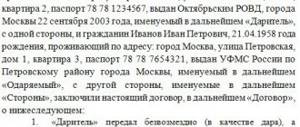Who has the right to inherit under a will?
A will allows a civilian to make dispositions of his or her real property in connection with his or her expected imminent death . Such a document refers to a unilateral transaction and expresses the will of a capable citizen who is capable of personally drawing it up. The legislative act (Chapter 62 of the Civil Code of Russia in Articles 1125, 1126, 1127, 1129) distinguishes the following types of testamentary documents for real estate and other property:
- according to the specifics of registration - notarized, as well as equivalent to such;
- if possible, the participation of a notary employee - open or closed;
- depending on the conditions of writing - ordinary and issued by citizens living under emergency circumstances.
A special feature of transferring an apartment by will is the execution of the last will, designating in this document not only his family and relatives, but also colleagues, employees, friends, and even the state and specific institutions. The testator can deprive potential heirs by law of the right to take possession of the inheritance, and can repeatedly change the content of the last expression of his will.
Attention! A document issued by a citizen through his authorized representative is not valid.
The will of the testator is provided to the employee of the notary's office in writing or described by the notary according to the testator. The use of mechanical and electronic printing devices (typewriter, computer) is also permitted.
submit an application for acceptance of inheritance to the local notary office at the address of the location of the inherited property (we talked about the conditions for entering into inheritance under a will for an apartment after the death of the owner here). Taking possession of a bequeathed apartment occurs six months after the death of the testator . The assignee is issued a certificate of ability to own real estate, which then must be registered with Rosreestr.
Who has the right to register an inheritance after the death of the owner?
In law
The main requirements for the heirs of the Civil Code of the Russian Federation are set out in its Article 1116. According to it, the bearers of the right to inheritance may be:
- persons who are alive at the time the will of the deceased is revealed to the relatives.
- Persons who were not alive at the time the will was written, but were conceived while the deceased was still alive and born after his death.
- Legal entities registered at the time of opening of the will
If the testator has not expressed his last will in any way, then the procedure for inheriting an apartment by law will be regulated by Chapter 63 of the Civil Code. It defines 3 main groups of heirs:
- first stage, which includes: children, parents and spouses;
- second stage, which includes: brothers, sisters, grandfathers, grandmothers;
- third stage, which includes: uncles and aunts of the deceased.
Subsequent groups in descending order are described in article 1149. This includes great-grandparents, children of nephews, and cousins. Even if these relatives could not be found, then formally relatives receive the inheritance: stepmother, stepfather, stepdaughter, stepson.
By will
Article 1119 of the Civil Code gives every citizen the right to freedom of will of his property. The apartment is transferred according to the same rules as other property. The testator has the right to name any person, including organizations, in the will.
He also has the opportunity to independently determine in what shares the heirs will receive the apartment. You can challenge his position after death only by proving his incapacity at the time of writing the will, then the apartment will be inherited in the general manner.
If, when mentioning an apartment in the will, the testator transfers it to several persons at once, but does not indicate the shares in which they will receive it, the property is divided equally between all the persons indicated by him.
However, there is a nuance that sometimes allows you to go against the will of the deceased without completely revoking the will: the right to compulsory inheritance. It is guaranteed by Article 1149 of the Civil Code. According to it, disabled heirs of the first stage, as well as persons who were dependent on the deceased person, receive 50% of the property that they would have received with equal inheritance.
This is easier to explain with an example. Let's say the deceased citizen Ivanov has a son who has a certificate of incapacity for work and is disabled. If citizen Ivanov does not mention this son in his will, then he still has the right to inherit the property of the deceased, and if an apartment was bequeathed, then he has the right to receive a share on an equal basis with the persons mentioned in the text.
Sometimes a dispute arises, possible thanks to paragraph 4 of Article 1149 of the Civil Code. According to it, there is a limitation on the application of the right of compulsory inheritance relating to residential real estate.
If the person who acquires the right to compulsory inheritance did not permanently reside in the bequeathed apartment, and the exercise of the right will lead to significant property problems for the person specified by the testator, the court, at its discretion, may deprive the disabled person of the right to receive his share in the apartment, or reduce it.
We talked in more detail about who has inheritance rights to an apartment according to law and will.
What categories of citizens can count on a mandatory share of the property of a deceased relative?
The desire of the legislator to help those most in need is reinforced by assigning them a mandatory share in the inherited property . This provision is the only restriction on the testator’s freedom of expression, which allows other persons to claim the inheritance regardless of his intentions.
The concept of “obligatory share” is used when not all obligatory heirs are mentioned in the testamentary document, or when part of the property they inherit is lower than expected. The list of persons entitled to assign them a mandatory share of the heritage is established by the Civil Code of Russia in Article 1149.
People close to the deceased have the right to receive an obligatory portion of the bequest:
- persons who have lived to retirement age, i.e., disabled citizens. These include the parents of the testator, the spouse of the deceased person, disabled dependents, adoptive parents;
- disabled children of the deceased who have not yet reached their 18th birthday (including adopted ones), adopted sons and daughters, and grandchildren. The rightful successor of the testator may also be a child conceived by him, but born after the death of the father;
- disabled people recognized as such according to disability group I, II or III. A mandatory condition for recognizing them as applicants for the inheritance is the period of their incapacity for work - one year before the death of the testator.
Most often, the obligatory part is formed from the property that for some reason is not specified in the will.
IMPORTANT! Knowing the list of heritage and its value, you can calculate the size of its obligatory part. The evaluation criterion is ½ of the total abandoned property that the applicant would have received under the law.
Entering into inheritance by law and will: pitfalls
Gifting is usually unconditional. The giver cannot demand material benefits or the fulfillment of any conditions for his gift.
However, if the donor wants the property to pass to a specific person, and not, for example, to his heirs, the contract can stipulate that if the donor survives the donee, the contract will be canceled and the property will return to the previous owner (if it was in property of the accused).
When concluding a gift agreement, the main thing to understand is that after registering the transfer of ownership, the property no longer belongs to you and you do not have any rights to it. It's important to keep a sense of reality when making such expensive gifts, especially if this is your only place to live. A gift agreement, unlike a will, cannot be changed or revoked - once the agreement is signed and registered with Rosreestr, there is no turning back.
The rules of intestate succession apply when the deceased did not leave a will. His property goes to his closest relatives in order of priority. In total, the legislation establishes 8 such queues. First, the first line of heirs is called (parents, children and spouse of the testator), in their absence - the second line (brothers, sisters, grandparents), and so on. The inherited property is divided equally among all the heirs of the summoned line.
Example. During his lifetime, the deceased citizen had the right of ownership to an apartment and a car. He has a legal wife, son and mother. They will receive an inheritance with a ⅓ share of the right to each object. In this case, the sister and brother of the deceased receive nothing.
Any of the legal successors may renounce their share in favor of a specific person included in the circle of heirs of any order. So, in the above example, the mother of the deceased renounced her share in favor of her daughter (sister of the deceased), who received 1/3 of the property. If the refusal is written without specific instructions, the property will be divided between the heirs of the called line - there will be an increase in shares. For example, a spouse and son will each receive ½ of the right to property.
The notary who formalizes the rights to property issues a certificate to each person who applies to him, which indicates what share of the inheritance he is entitled to by law or by will. If the legal successors are not comfortable with shared ownership, they can draw up an agreement on the division of the inheritance and have it certified by a notary.
Let's use the previous example: the sister of the deceased agrees to receive full ownership of the car with payment of monetary compensation for a third of the apartment she is entitled to minus 2/3 of the cost of the car. In this case, the property will be re-registered in the name of two owners: the testator’s spouse and his son.
Also, the heir has the right to demand the allocation of his share in kind, but this is not always possible. Such an allocation can only be made in court. If the apartment is large and one or two rooms can be allocated as part of the inheritance share, the court may make a positive decision.
More often than not, real separation of property is impossible without causing disproportionate damage to property that is in common ownership. For example, this is a one-room apartment or there are many heirs and the shares in the right are insignificant. In this case, the court usually decides to pay the plaintiff monetary compensation from the legal successors who actually own the property.
In a testamentary disposition, the testator himself determines what share is due to the person indicated by him. If there is no such indication, the relatives receive the property in equal shares. The will may not indicate all the property of the deceased, then the untested part of it will be divided by law.
Example: a deceased citizen left a share in an LLC to his son in his will. In addition, the inheritance mass includes a house, land, and a car. This property will be divided among the heirs of the drafted line, including the son.
Receiving an inheritance under a will does not deprive relatives of the right to receive their share by law and vice versa. These are different grounds of inheritance - the right to each is formalized independently of the other.
The law limits the testator's free will to only one condition. Those who are unable to work and whom he supported at his own expense during his lifetime should be provided for from his property. The category of such persons includes:
- minor children of the deceased and disabled children, regardless of age;
- father, mother, spouse who have reached retirement age or have a disability;
- heirs at law who are dependent on the testator for at least a year before death;
- persons living with the testator, whom he provided for at least a year before his death, regardless of the degree of relationship.
The listed categories of citizens receive shares from the property of the deceased equal to ½ of what they could receive upon inheritance by law. Their part is allocated from intestate property, and if there is none, from bequeathed property (that is, at the expense of the heirs under the will).
For example, the testator has a spouse and a disabled illegitimate son. If inherited by law, each of them would receive half of the property. If there is a will in favor of the wife, the son will receive a ¼ share of the property. When calculating the obligatory share in the inheritance in a will, everything that the relative received for various reasons (by will or by law) is taken into account.
Thus, the legal successors of the deceased receive his property in common shared ownership. They have the right to renounce their share without specifying a specific person (except for a mandatory one) or in favor of a specific heir, as well as to make a division of property at their personal request with a notary.
Contact the notary office of Igor Vladimirovich Kolganov to receive qualified advice on the issue of allocating and registering a share in the inheritance of a deceased relative. The notary is open daily until 20.00 pm, and you can also make an appointment on Saturday.
Many citizens do not realize that inheritance is not only the rights to the property of a deceased relative. The obligations of the deceased also pass to the legal successor.
The inheritance includes: things belonging to the testator, property, property rights and obligations.
It is impossible to enter into inheritance rights only for property, refusing to fulfill obligations . By entering into inheritance rights, the successor agrees to accept the entire complex of what remains after the death of the testator.
In practice, a clear example of the transfer of property rights and obligations is a mortgage. The assignee receives the property, and together with it must repay the remaining amount of the mortgage loan. Creditors by law have the right to claim debts from the heirs of a deceased debtor.
An inheritance agreement is a new basis for inheritance (introduced by law dated July 19, 2018). Unlike a will, it is a bilateral transaction (concluded between the testator and heirs). The testator may enter into one or more such agreements with the heirs. An inheritance agreement, like a will, must be notarized.
Despite a number of features that distinguish an inheritance agreement from a will, the methods of accepting such an inheritance remain the same as when inheriting property under a will or law. The heir under an inheritance agreement can also accept the inheritance through actual actions or from a notary.
Within the framework of this article, we tried to consider the main points related to the procedure for entering into inheritance by law and by will. We hope this was informative for you, but don't forget that we are ready to answer your questions at any time.
Legal justification for receiving living space without a will
A common type of inheritance of an apartment is the receipt of inheritance by successors on a legal basis . This category includes individuals who were related to the deceased during his lifetime. All legal successors form an eight-level queue , described in Articles 1141, 1142, 1143, 1144, 1145 of the Civil Code of Russia.
The primary legal successors are the spouses of citizens who have completed their lives, their parents, and children. When the testators have no one left alive, the second-order successors - sisters and brothers (both full and half-blooded), grandparents on both sides - . Using their right of representation, nephews and nieces will also be able to inherit real estate . If there are several of them, the property is divided into a certain number of shares.
Third-priority heirs are the uncles and aunts of the deceased testator ; their children - first cousins - will be able to accept the inheritance by right of representation.
If there are no living relatives of the first three stages, the great-grandparents of the deceased - representatives of the fourth stage - can take possession of the property. The fifth line of successors are female or male cousins , as well as great-uncles and grandmothers. Children of representatives of the fifth stage act as legal successors of the sixth stage.
When the testator does not have any of the above, the stepfather, stepmother, stepdaughters or stepsons of the testator, who are the legal successors of the seventh stage, are called upon to inherit. Disabled (incompetent) persons who received financial support from the deceased are representatives of the eighth stage.
To whom will non-privatized housing be transferred in the event of the death of the responsible tenant?
Since only the personal property of the deceased is inherited , a non-privatized apartment, which he did not manage to register in his name during his lifetime, cannot become such an object. It can still be rented out under the DSN (social tenancy agreement) to the relatives of the deceased employer (Article 672 of the Civil Code of the Russian Federation).
There are cases when the responsible employer initiated the privatization procedure before his death and carried out:
- submitting a statement of intention to privatize housing to the authorized bodies;
- providing a package of necessary documents (read more about what documents you need to collect to inherit an apartment).
At the same time, an important circumstance for the heirs is that he does not change his mind and does not withdraw his application , since on the basis of these documents, the heirs will legally be able to achieve inclusion of the apartment in the heritage list . The basis is the norm of the Resolution of the Plenum of the Supreme Council No. 8 / 08/24/1993.
Attention! Persons who are relatives of the deceased person, who were registered and lived in this apartment with him before his death, have the right to re-register the DSN for one of them. Such an employer will be able to carry out the process of privatization of real estate in accordance with the provisions of Law No. 1541-1, dated 07/04/1991.
You can find out whether it is possible to inherit a privatized apartment without a will and how to obtain housing according to the law here.
Features of inheriting apartments before and after privatization
Most apartments in Russia are privately owned. The rest are occupied by residents under a social tenancy agreement. If the apartment is privatized, the owner can dispose of it at his own discretion and appoint any person as heir. But when the living space is occupied by a person under a social tenancy agreement with the local municipality, he cannot appoint an heir, because he simply does not own this apartment.
If a person with whom the municipality had a tenancy agreement has died, then his relatives who lived in the same apartment should apply to re-register the social tenancy agreement and then privatize the apartment, becoming full owners.
The issue of re-registration is regulated by paragraph 2,672 of Article of the Civil Code of the Russian Federation.
You will find more information about inheriting a privatized apartment here.
How to obtain the right to own an apartment by inheritance?
The ideal case of transferring real estate - an apartment - into inheritance involves the potential successor contacting a notary's office within the prescribed period - 6 months from the death of the testator , having filed a statement of intent to inherit the apartment. The following package of documents must also be presented to the notary representative:
- A certificate indicating the fact of the death of the testator.
An example of a completed document is shown in the photo below: - Documentary confirmation of family ties with the deceased citizen in the form of certificates certifying the fact of birth, marriage (or divorce), change of surname, etc.
- A certificate issued by the Criminal Code, Homeowners Association, Housing Unit or an extract from the house register at the address of the testator’s last place of residence.
A sample document in the photo below: - The original testamentary document with a record that the expression of will has not been changed or revoked by the testator.
- Documents establishing ownership of inherited real estate.
- A certificate confirming the fact that there is no debt for the apartment.
The picture shows a sample of a completed document: - Confirmation that the testator financially supported a certain person during his lifetime - confirmation of disability in the form of a VTEK certificate, a pensioner's certificate.
Sometimes an employee of a notary office, approached by a potential heir, is forced to refuse him due to the absence of some official papers or the delay in filing an application for his rights. To achieve the goal, you must prove your competence in court.
IMPORTANT! A court decision that satisfies the plaintiff can replace the notarization of the right to own an apartment, i.e., it will become a document of title.
Inheritance by will and by law, how to enter into an inheritance?
The death certificate, as well as an extract from the house register, are provided to the applicant free of charge.
State fee for notary services:
- 0.3% for heirs of the first and second stages (but not more than 100,000 rubles);
- 0.6% for heirs of any order, except the first and second (but not more than 1,000,000 rubles).
If you seek help from lawyers, the amount of expenses for entering into the right of inheritance may increase significantly depending on the volume of services provided to the heir:
- legal advice will cost 500-1000 rubles, and comprehensive management of inheritance matters - from 25,000 rubles.
If the heir does not contact the notary to accept the inheritance within six months for a good reason (due to illness, long business trip, military service of the heir, etc.), it is possible to restore the period for entering into the inheritance.
The procedure for restoring the term is usually carried out in court, but it is also possible without going to court: upon obtaining consent from the heirs who have already assumed their rights.
Such consent can be obtained only in the presence of a notary, who will attest to it, thereby canceling the certificates of the right to inheritance issued earlier.
Property is recognized as escheat in the absence of heirs by law and will, and also if:
- None of the heirs assumed their rights;
- All heirs renounced their right, without indicating in whose favor;
- Heirs do not have the right to accept the inheritance, including due to exclusion from inheritance.
Escheated property is transferred by inheritance to the Russian Federation or its constituent entities, and can also be transferred to the ownership of municipalities.
If the heir dies before accepting the inheritance, the right to accept it passes to his heirs.
They will have to declare their decision to take ownership of the inherited property within the remaining period of time allotted for the first heir.
The remaining period can be increased to three months if there is less time left before entering into the inheritance.
Now about inheritance by law and the order of inheritance of a share.
Now there is the following procedure for inheriting part of the property:
- 1st stage – spouses, parents and children;
- 2 – brother, sister, grandfather and his wife;
- 3 – uncle, aunt;
- 4 – great-grandfather, great-grandmother;
- 5 – children of cousins, sisters and brothers of grandparents;
- 6 – grandchildren of nephews, nieces, children of cousins, cousins, uncles and aunts;
- 7 – stepson, stepdaughter, stepfather, stepmother.
When the indicated applicants are not among the receivers, then the disabled dependent of the deceased receives the rights to the property.
REFERENCE! If the applicant, by law, does not live to see the division of property, then the inheritance rights are transferred to his successors. This is called view inheritance.
You can draw up a will yourself or with the help of a notary, but in any case you will need to pay a 100 ruble state fee for notarization. The services of a notary or lawyer for consultation and drafting the text of a will depend on the region and the notary company itself - on average it will cost 2-4 thousand rubles.
Entering into an inheritance will also require money - close relatives will have to pay 0.3% of the value of the property (but not more than 100 thousand rubles), other persons - 0.6% (but not more than 1 million rubles).
A will provides ample opportunity for subsequent maneuvers - it can be changed at any time, or even revoked as if it never existed. Also, during his lifetime, the owner can do whatever he wants with his real estate, even with a written will - rent it out, register other tenants in it, donate it, sell it - in the last two cases, when the will is disclosed, the heirs will simply have nothing to receive.
If the property has one owner, it is very simple to draw up a gift agreement - draw it up in free form, sign it by both parties and, together with the documents for the property, submit it for registration to Rosreestr. There is no need to have such an agreement certified by a notary. But if only a share in an apartment is given as a gift, the agreement will need to be notarized (at the same time, the owners of the remaining shares do not have the right to a pre-emptive right to purchase, unlike a transaction with the purchase and sale of a share).
If the donor has minor children who are also owners of real estate, then permission from the guardianship authorities will be required to conclude a gift agreement. And if the property was purchased during marriage, the notarized consent of the husband or wife will be required.
If you draw up an agreement yourself without notarization, you will only have to pay the state fee for registering the transfer of ownership - 2 thousand rubles. If you need advice and certification from a notary, it will cost about 6 thousand rubles.
The tax on an accepted gift does not apply to close relatives (children, spouses, parents, grandparents, grandchildren, brothers and sisters). In another case, the recipient will have to pay a tax of 13% of the cadastral value of the property.
Useful video
In this video you will receive advice from a qualified lawyer on issues of inheriting an apartment under a will.
The possibility of transferring and accepting an apartment as an inheritance, which appeared as a result of its privatization, does not always proceed smoothly and without problems. A typical situation is the emergence of disputes and conflicts between relatives who once lived peacefully. To avoid resolving disagreements in court, it is necessary for both testators and successors to know the basic provisions about the types of transfer of real estate by inheritance.






